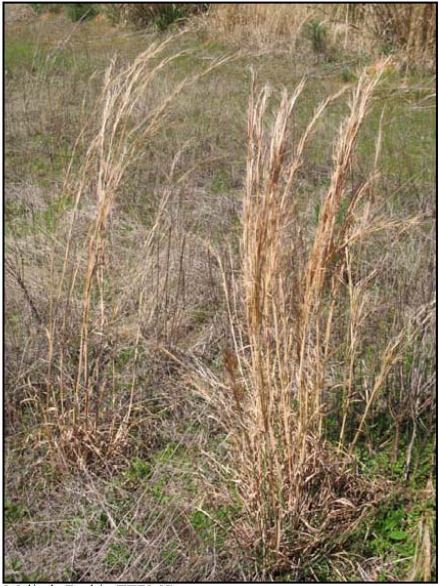
Mature broomsedge. Photo credit: Melinda Brakie, USDA NRCS East Texas Plant Materials Center
It is common place now to see maturing broomsedge in our pasture and hayfields. Broomsedge bluestem (Andropogon virginicus) is not really a sedge at all, but a native grass. It seems to shoot up overnight after being inconspicuous for most of the growing season. This clump-forming, native warm season grass turns golden brown in the fall with numerous white seed heads that are easily dispersed by the wind. The bad news is the nutritive value as livestock forage is very low which makes our pastures less productive when the broom-sedge component increases. Low fertility soils and over-grazing leads to the encroachment of broomsedge. The presence of this grass is an indicator of low pH and low phosphorus, and to some degree low potassium (potash) in your soils. It is always wise to test your soil to confirm these deficiencies.
The majority of pasture herbicides are not effective in controlling broomsedge, without killing your desired pasture grasses. Control of broomsedge in established pastures requires using weed wiper equipment or spot treatment with glyphosate herbicides. In late summer broomsedge will begin to tower above other grasses allowing for selective control using a wicking device. Herbicides will be most effective on healthy, actively growing plants, so avoid application during periods of extended drought, and after maturity with seed head formation. This is the time of year to make note of the most serious infestations for treatment in the years ahead.
Of course as the name applies you can make brooms from the broomsedge to sell and subsidize the income lost from your pastures caused by this grass. But, on a more serious note, broom-sedge does provide nesting areas for turkey and quail in forested areas. Small birds also utilize the seeds in the dormant, winter months when other seed is unavailable.
Source:ufl.edu